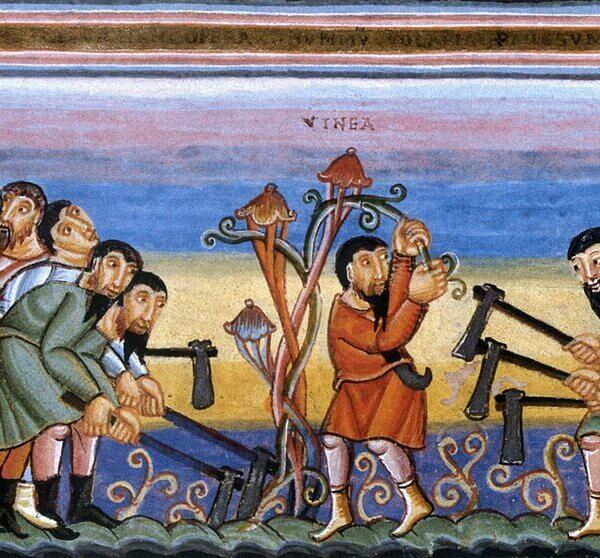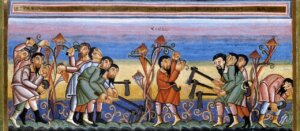
Plenty Enough
 Friday afternoon, we received the funds from the assignment of the bell tower lease for deposit into Emmanuel’s endowment fund at Rockland Trust Company. That’s also where Janet Hunt’s bequest has been deposited, and together these funds will generate interest earnings that are just enough to replace the current monthly Verizon lease payments. We’ll continue to add bequests, designated endowment gifts, and other available funds to the endowment to build this income source for Emmanuel’s future generations. With the assignment, we eliminated the risk that Verizon would terminate the lease early, or amend the lease in a way that would reduce Emmanuel’s benefits.
Friday afternoon, we received the funds from the assignment of the bell tower lease for deposit into Emmanuel’s endowment fund at Rockland Trust Company. That’s also where Janet Hunt’s bequest has been deposited, and together these funds will generate interest earnings that are just enough to replace the current monthly Verizon lease payments. We’ll continue to add bequests, designated endowment gifts, and other available funds to the endowment to build this income source for Emmanuel’s future generations. With the assignment, we eliminated the risk that Verizon would terminate the lease early, or amend the lease in a way that would reduce Emmanuel’s benefits.
The assignment price is less than we would have received in rentals over the remaining 45 years of the lease term — again, assuming that we didn’t lose the lease altogether or have to negotiate lower rental payments as the price of keeping it. So with the lease assignment, we didn’t get everything we might have dreamed of, but we did get enough to create an endowment fund plus a partner, who really knows the cell tower market, to look out for our mutual interests on a daily basis. When we stand back and get some perspective, we can see that’s enough for today.
 We pray in the Lord’s Prayer, “Give us this day our daily bread,” not “Give us a stockpile of food in a warehouse to assure us of a lifetime of plenty.”There’s an old New Yorker cartoon, where the genie coming out of a lamp explains to a dog that looks just like Buoy Wells that when she’s wished once for food, she can stop using her other wishes for food. The dog looks at the genie in disbelief, and I think that plenty enough is hard for any of us to see. I think it’s just human nature — or even the nature of most living things — to want more, and to see what is fair, or what we have earned, from our own perspective.
We pray in the Lord’s Prayer, “Give us this day our daily bread,” not “Give us a stockpile of food in a warehouse to assure us of a lifetime of plenty.”There’s an old New Yorker cartoon, where the genie coming out of a lamp explains to a dog that looks just like Buoy Wells that when she’s wished once for food, she can stop using her other wishes for food. The dog looks at the genie in disbelief, and I think that plenty enough is hard for any of us to see. I think it’s just human nature — or even the nature of most living things — to want more, and to see what is fair, or what we have earned, from our own perspective.
Vineyard Owner
We find our built-in focus on our own perspective today in Matthew’s gospel, the parable of the vineyard owner who hires an initial staff of grape pickers in the morning, building out the staff in successive hires throughout the day. When evening came, he told his manager to call all the workers in, starting with the last hired, and then paid them all the same wage. So far, so good, right? Not even. Not to the workers who’d been picking grapes since dawn. They grumbled against the landlord when their turn came, thinking that because they’d worked longer, they should receive more. And maybe this sounds unfair to us too, if we think of ourselves as hard workers, up early to put in a full day. But this is Jesus telling the parable, and this is the Kingdom of Heaven we’re talking about.
In Matthew’s gospel, Peter has just asked Jesus what the disciples — who have left their work and families to follow Jesus — will have to show for their efforts. Jesus answers that they will inherit eternal life in the kingdom of heaven and then tells them today’s parable. Berkeley Divinity School at Yale Dean Andrew McGowan says, Parables are simple, but not easy. They don’t require book-learning, but they do allow and even expect us to misunderstand them, because we all see situations from our own perspectives. And parables are full of real life details, to make sure we can all find a personal way to relate to the story from our own perspective and experience. We can also be sure that perspective is going to be unsettled by how the parable unfolds, because we’re all going to see something different. When Jesus starts talking about the kingdom of heaven, we have to lean in and listen hard, holding space for different ideas, and remembering that our own experience does not set the norm for other people’s reality.
 So where do you fit in this parable? The overachievers among us (oops, busted) laid out our work clothes the night before and arrived at the market bright-eyed and bushy-tailed, ready to put in a full day. Who is this landowner who manages his work flow in such a wasteful, inefficient way, and then treats his workers unfairly at the end of the day? Has he managed his vineyard productively and well? Why would a wise and fair landowner set up such an inequitable pay structure? From the early birds’ point of view, one group works from early morning to evening in the hot sun, bending over with their aching backs to pick and carry the heavy, ripe grapes.
So where do you fit in this parable? The overachievers among us (oops, busted) laid out our work clothes the night before and arrived at the market bright-eyed and bushy-tailed, ready to put in a full day. Who is this landowner who manages his work flow in such a wasteful, inefficient way, and then treats his workers unfairly at the end of the day? Has he managed his vineyard productively and well? Why would a wise and fair landowner set up such an inequitable pay structure? From the early birds’ point of view, one group works from early morning to evening in the hot sun, bending over with their aching backs to pick and carry the heavy, ripe grapes.
The last group of pickers were hired in the market about an hour before quitting time. By the time they got to the vineyard, they probably only had enough time to pick up a basket and gather a bunch or two of grapes before the work day was over. Isn’t that just a quick way to start a labor dispute and run your business into the ground? Jesus sets this idea up in the parable by making sure we’re focused on feeling shortchanged and overlooked. He gets us identifying with the early bird workers. The early bird gets the worm, right? In telling this parable, Jesus is touching every last sensitivity we’ve ever had about being treated unfairly. But the landowner’s rebuke to the early birds’ grumbling for paying the latecomers the same wage opens our eyes to other perspectives. This is the kingdom of heaven we’re talking about! Jesus reminds us to take a look at others’ perspectives and lived experiences by turning our expectations around.
What about the landowner, who makes five separate trips to the marketplace to hire more workers? Maybe those of you who have owned or managed businesses know the experience of being willing to hire additional staff at any time and any wage to meet the demands of the business and the needs of the customers. Is the landowner’s decision to pay the latecomers the same wage as the early birds unfair when the early birds received the day’s wage they agreed to that morning? Is the landowner’s flexible staffing process wasteful and inefficient as a business matter, or was he adaptive and nimble in the market to meet demand? Jesus is telling us that in the kingdom of heaven, God holds space for different realities and perspectives, and the welfare of the whole community matters.
In the kingdom of heaven, an employer makes 5 separate trips to the marketplace to hire more workers, walking back and forth from the vineyard in the scorching heat of the day hiring every last person who needs work — even those who weren’t there bright and early, but who had to care for a sick parent or child, or who had to walk several miles to catch a bus to get there, or didn’t look fit and strong because they didn’t have enough to eat at home. And even those who were women, or from a religious or ethnic minority — different from the landowner’s background. Jesus is telling us that the kingdom of heaven is inclusive, with space for everyone’s lived experience. In the kingdom of heaven, the welfare of the whole community matters, and the landowner knows that if one group suffers, the body does not thrive. The kingdom of heaven is near, but not yet here. The kingdom of heaven is already, but not quite yet. The kingdom of heaven is not what is happening in the world today, but what can happen when we find a way to see others’ realities, and find a way for everyone to have plenty enough. Amen
